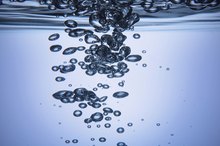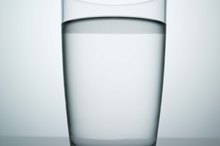Can the Human Body Absorb the Minerals in Water?
Natural spring and mineral water contains numerous minerals that your body needs in small amounts for a wide variety of functions, including nerve conductance, muscle tone and bone growth and repair. Commercially bottled varieties sometimes add minerals for taste and health purposes. Distilled water contains no minerals and when consumed in large quantities may actually leach minerals from your body. Water is a good medium through which your body can absorb minerals, both internally and externally.
Intestinal Mineral Absorption
The vast majority of mineral absorption occurs in your small intestine. Minerals within food are often bound to proteins and other organic molecules, so the process of chewing, dissolving them in saliva and further digesting them in the stomach are important preparative steps prior to efficient absorption, as explained in the book, “Functional Biochemistry in Health and Disease.” As such, minerals often arrive in the small intestine as charged ions in ionic solution, also called colloidal solution, which facilitates their absorption. Although minerals are essential to your health in small amounts, most are quite toxic at high concentrations, so your body practices efficient but limited absorption. Intestinal absorption is a key regulatory step in mineral homeostasis.
Mineral Absorption from Water
The Best Liquid Minerals
Learn More
In general, minerals already dissolved in water are more bio-available than solid forms, although many factors affect absorption within the small intestine, such as pH levels, health of the mucosal lining and the presence of other nutrients, as noted in the text, “Advanced Nutrition and Human Metabolism.” A French study published in a 2002 edition of the “European Journal of Clinical Nutrition” found that the absorption and bio-availability of magnesium in magnesium-rich mineral water was almost 60 percent in healthy male volunteers. The researchers noted that magnesium absorption decreased with age.
Supplement Absorption Comparison
In comparison to absorption of minerals in water, supplemental forms are not absorbed as well. According to a review article published in a 2002 edition of the “Geriatric Times,” supplemental magnesium absorption ranges from about 30 to 41 percent and depends on age, intestinal health and type of magnesium supplement.
Transdermal Absorption
How to Get Rid of Skunk Smell on Humans
Learn More
In addition to intestinal absorption of minerals, some can be absorbed through the mucosa of your mouth and lungs, and transdermally through your skin when dissolved in water. This is because your skin is not just a cover; it’s actually a selectively absorptive organ. As such, taking a bath or shower in “hard” or mineral-rich water can be a minor source of minerals for your body, though you may also absorb potentially harmful compounds such as chlorine and lead through the same pathways.
Cautions
Minerals within drinking water are beneficial, even though they may leave mineralization and soap scum in your bathroom and kitchen. Most water purifiers are effective at removing harmful bacteria and chemicals from your water, but most systems such as reverse osmosis and distillation units also remove beneficial minerals. As such, adding colloidal minerals to your purified water may be of benefit.
Related Articles
References
- “Functional Biochemistry in Health and Disease”; Eric Newsholme et al; 2010
- “Advanced Nutrition and Human Metabolism”; Sareen Gropper et al; 2009
- "European Journal of Clinical Nutrition"; Magnesium Bioavailability from Mineral Water: a Study in Adult Men; M. Verhas et al.; May 2002
Writer Bio
Sirah Dubois is currently a PhD student in food science after having completed her master's degree in nutrition at the University of Alberta. She has worked in private practice as a dietitian in Edmonton, Canada and her nutrition-related articles have appeared in The Edmonton Journal newspaper.









